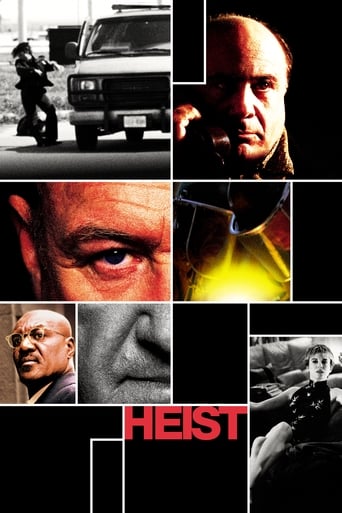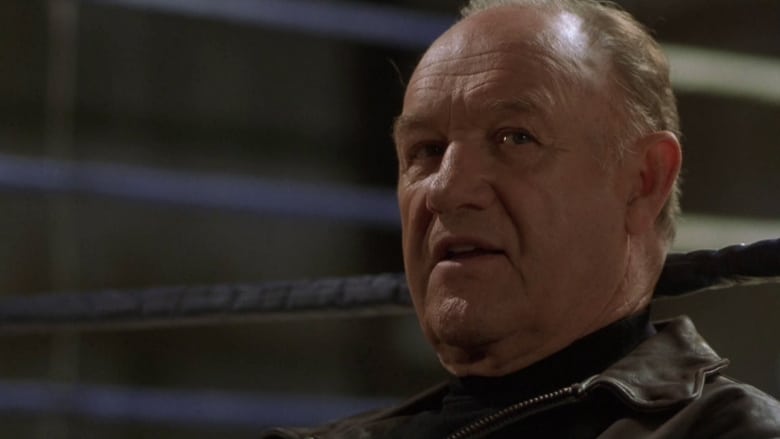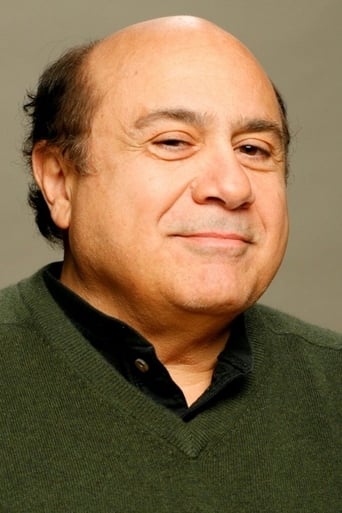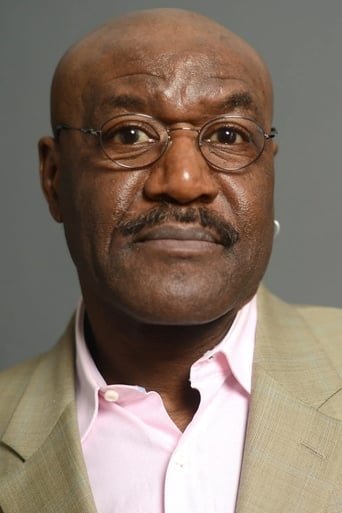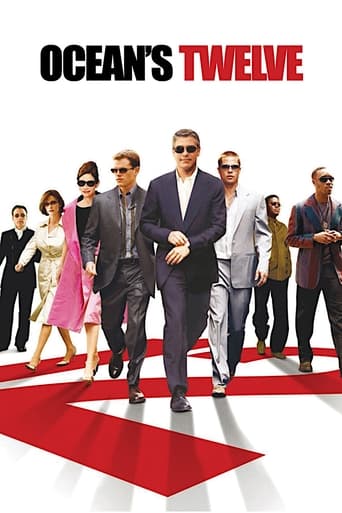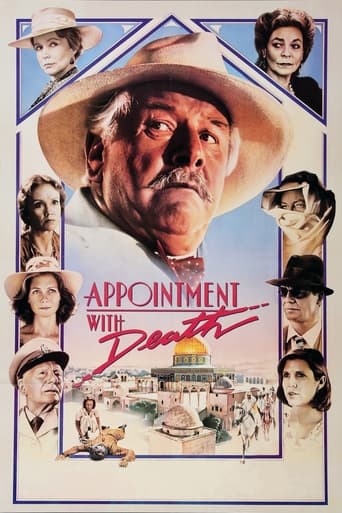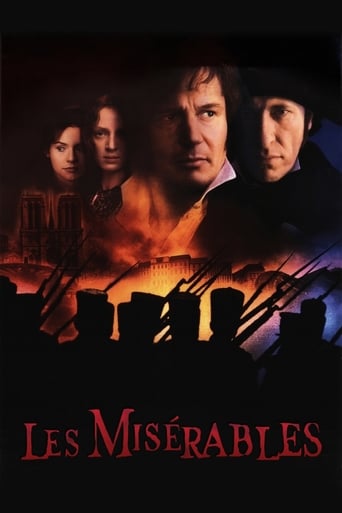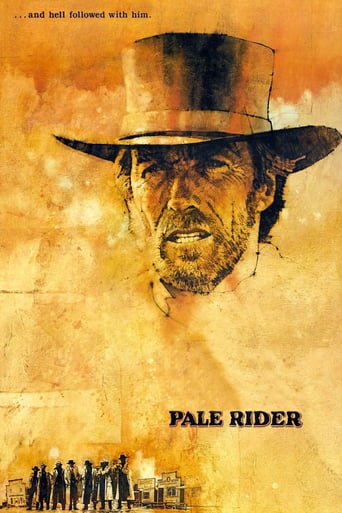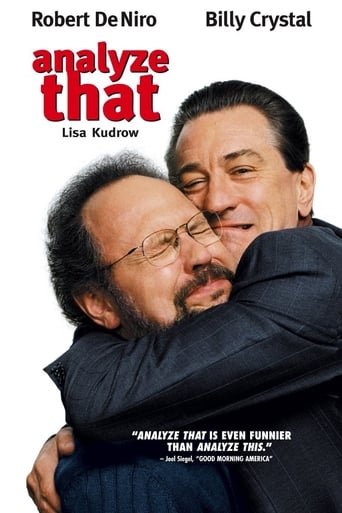Heist (2001)
Joe Moore has a job he loves. He's a thief. His job goes sour when he gets caught on security camera tape. His fence, Bergman, reneges on the money he's owed, and his wife may be betraying him with the fence's young lieutenant. Moore and his partner, Bobby Blane, and their utility man, Pinky Pincus, find themselves broke, betrayed, and blackmailed. Moore is forced to commit his crew to do one last big job.
Watch Trailer
Cast
Similar titles
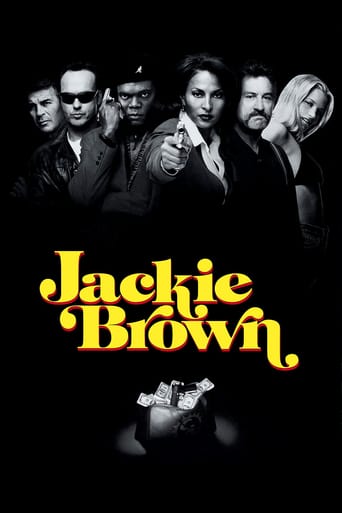
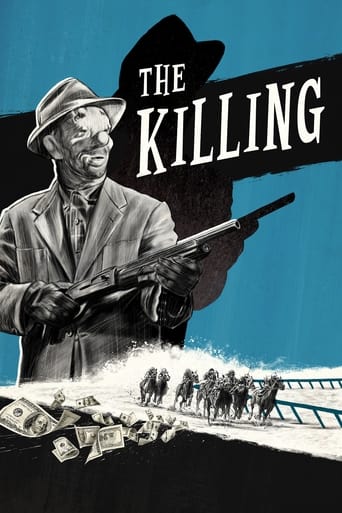
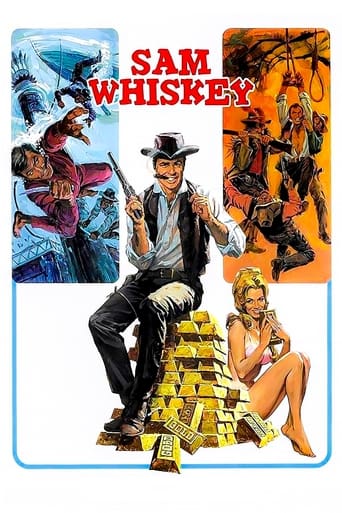

Reviews
Just perfect...
Fantastic!
As Good As It Gets
If the ambition is to provide two hours of instantly forgettable, popcorn-munching escapism, it succeeds.
Written and directed by David Mamet, this superior crime thriller begins with a brilliantly choreographed jewellery-store robbery that demonstrates just how professional and skilled the team of thieves are. The obviously high level of trust and understanding that they share, enable them to cope when things don't go exactly as planned and to improvise well whenever the need arises. The pace and precision of what happens in these opening scenes is impressive and intriguing and sets the tone for everything that follows. Numerous plot twists, double-crosses and humorous moments then add to the fun as the plot becomes increasingly complicated and the gang have to cope with some unexpected challenges.When veteran thief and gang-leader Joe Moore (Gene Hackman) accidentally has his picture captured on a security camera during a high-value jewellery robbery, he knows that the most sensible course of action is to retire immediately and head south on his boat with his much younger wife Fran (Rebecca Pidgeon). He encounters a problem, however, when his fence and financial backer Mickey Bergman (Danny DeVito) opposes the plan because he's already invested a large sum of money in setting up the gang's next job. Bergman isn't willing to make any concessions and withholds the gang's share of the proceeds of the robbery to force them into carrying out "the Swiss thing"."The Swiss thing" turns out to be an extremely dangerous but highly lucrative robbery of a huge shipment of gold from a Swiss cargo plane. To make matters worse, however, the distrustful Bergman stipulates that his nephew Jimmy Silk (Sam Rockwell) has to go along as one of the gang to ensure that they go ahead with the heist exactly as planned. Silk is young, inexperienced and impulsive and also has designs on Fran. He sees Joe as an old guy who's losing his grip and soon starts to think of how he could get away with both the gold and the girl.Joe feels compelled to go ahead with the gold heist and although he has complete faith in the loyalty and professionalism of his right-hand man Bobby Blane (Delroy Lindo) and his diversionary expert Pinky (Ricky Jay), the on-going presence of Jimmy Silk continues to be a source of great concern even after the ambitious heist has been successfully carried out.David Mamet's style of direction is perfect for this material as he brings great coherence and momentum to the intricate plot and his dialogue, as usual, is sharp, witty and quite unique. Some clever quips and brilliant banter illuminate the exchanges between the main characters but the usual formality and stilted nature of Mamet's lines are less apparent in this movie, possibly due to the presence of Gene Hackman. His skillful delivery is so warm and natural that it makes even the most contrived phrases sound quite spontaneous and his interactions with Delroy Lindo are a real highlight. Both actors excel in this movie as do Ricky Jay and Danny DeVito who also make their characters very real.The high quality of the direction, the writing and the acting ensure that a higher-then-average rating is merited but what's probably even more impressive is the way in which Mamet has taken a very simple and familiar plot and developed it into an enjoyable thriller that actually gets better with each repeat viewing. In the case of "Heist", once is definitely not enough.
This is a review of "Heist" and "Spartan", two unconventional thrillers by David Mamet. Both films mark the beginning of Mamet's crypto-fascist period, in which he slid from angry left-winger to right-wing caricature. Henceforth his scripts would become obsessed with the aesthetics of toned bodies, knife-fights, semi-naked wrestlers, and US special agents who excel at taking down Arabs and head-shotting bad guys ("Spartan" would later be worked by Mamet into "The Unit", a TV series which follows a US Spec-Ops group).On the flip-side, working within the confines of genre (the heist movie in "Heist", the action movie in "Spartan") allows Mamet to perfect the kind of blunt functionalism he's been working toward throughout his career. And so both films feature extremely parred down dialogue, narratives which are barely told, professional characters who worship at the altar of efficiency, and minimalist dialogue which moves with a distinctly staccato, or almost perfunctory rhythm.Both films are also explicitly cinematic con jobs. Mamet, of course, has long been a director who approaches storytelling as an elaborate card trick, his films oft about magicians, hucksters or con artists. In this regard, both "Heist" and "Spartan" constantly defy audience expectations. Watch how Mamet very subtly subverts and plays with genre tropes, uses dialogue to mask and misdirect, how he approaches scenes from odd angles, every sequence always just a "little bit off", and watch how he continues his trend of casting comedians in serious roles. This mirrors the philosophy of both films' heroes, who rely on doing the unexpected. Take one scene in "Spartan", in which our hero repeatedly asks "Why's the TV on?", the nonsensical, repeated phrase designed to misdirect and scrabble the mind of his opponents. Such tactics result in an interesting hybrid: films which feel at once generic and off-kilter.Mamet is clearly more interested in professional mastery - a trait which his heroes share - than in the production of masterpieces. Indeed, after "Homicide", Mamet would write a book in which he explains his new film-making philosophy. From this point onwards he would strip his films down drastically. The result: simple lighting, direct dialogue, unfussed camera work and minimal music.Consider this line from Mamet's book: "Acting should be a series of simple physical actions. If the actor wants to know how he should walk to a door in the scene, the director should tell him, 'Go to the door,' and, if the actor presses on: 'Go to the door. Quickly.' Don't act. Don't emote. No motivation. No back-story. No character arc. No discovery. These are indulgences that cannot possibly be manifested physically. Just go to the door. Quickly. Cut. Print. Go home." Mamet's new found philosophy – which he calls "heightened logic" - perhaps offers an understanding into why his films are so mannered, why his stories all revolve around elaborate cons and why he's drifting toward pulpy genres.If on the surface Mamet's films tend to be about con-jobs, covertly they're all about Mamet's true passion: language. Language is often – if not inherently - selfish. To talk, especially in the way that Mamet's characters talk, is to con. Stunted half sentences and droning repetitions aren't there just for the fun of it. They are successful and less successful attempts at persuasion.In this way, you might say Mamet's films are all about words and syntax (his "Oleanna" stage-play would be about a kind of "word rape"). Post "Homicide", however, his directing style evolved in such a way as to eradicate everything that detracts from his words. By removing music, cinematography, acting, sound etc, you've essentially cancelled out the director's "vision". And after you've cancelled out a director's "vision" and an actor's "interpretation", nothing remains but the writer's prose.Elsewhere, Mamet's later films tend to be preoccupied with a kind of Zen like professionalism, a trait which he himself shares as a writer (his scripts are attempts to perfect the "word", to hone and purify one's personal skills). As such, his later films often feature an antagonistic bond between mentor and protégé, Mamet's younger characters always striving for the professionalism represented by the older mentor. We see this in both "Heist" and "Spartan", both films revolving around wise old timers who have neither the time nor the inclination to school the less-seasoned buffoons around them. "Spartan", incidentally, is a loose remake of Mamet's script for "Ronin". Both films are "named" after ancient warriors, and feature highly skilled, lone wolf heroes. In "Spartan" we have Val Kilmer as a machine-like guy hell bent on finding a kidnapped girl ("Where is the girl?" he repeatedly says, his phrase uttered like dispassionate machine code), and in "Ronin" we have Robert DeNiro as an ex special forces agent determined to retrieve a mysterious case.Unfortunately, both "Heist" and "Spartan" end with unimaginative shoot outs. Such routine endings are somewhat common in Mamet's work.8.5/10 - Worth multiple viewings.
Many of the reviews on this film mention the fact that it is overcomplicated and may have one twist too many. Good. I like to have to think about what's on the screen. If I want to switch off and simply stare, I'll watch a Transformers movie. For those viewers who like to keep on their toes and have to assess and maybe even re-assess what they are seeing this is a great movie. Snappy, quick fire dialogue, the kind of criminal, low life patois that Mamet does so well is peppered throughout the film, with staple Ricky Jay "cute as a Chinese baby" or "And there he goes!" getting some of the best lines. Top notch performances all round from all the cast members make this a classy, complex movie. Hackman's criminal mastermind is more than an equal to DeNiro's Neil McCauley in Heat but minus the sub-machine guns, and with a real world weariness about him, as he tries to ensure his last "thing" pays off. Delroy Lindo, Danny De Vito and Sam Rockwell don't let the side down either with strong support performances,and Rebecca Pidgeon as Hackman's much younger wife is diamond hard and dangerous as the only female in a world of double dealing Alpha males. Fans of the genre will be happy to watch it more than once as the web woven and the crossfire dialogue means there is always some new slant on events. Complex plotting, quotable dialogue, strong leads and supporting actors and David Mamet at the helm mean there are many worse ways to spend an evening.
The film is literally about a group of people who know exactly how to communicate and collaborate without even having to confer by speaking, confronted with a newcomer who doesn't speak that language at all, and probably couldn't to save his life, but they're nevertheless forced to deal with him. Mamet's twists aren't just "twists." They work at this fundamental level, for instance as they all work right under our noses to rid themselves early in the game of this unexpected liability, how every character knows what the other really means and implicitly goes along with it lock, stock and barrel. This greenhorn, in all seriousness, expresses his guileless lack of understanding of what would ordinarily be expected to be meant, let alone the real situation as regards to him. Later on, when chance comes back to bite them, leader of the pack takes a moment to think, then gives them tasks. His number two guy asks where he's going with this, to which he just replies, "Just listen." They often nod to each other from a distance and no one else sees. We've seen this done a lot, but not in this way too often: What is the idea that one is communicating that the other immediately acts upon? Hackman plays Joe "Cute as a Chinese Baby" Moore, a thief whose real passion is building boats. His crew comprises Bobby ("You know why the chicken crossed the road? 'Cause the road crossed the chicken.") and Pincus ("He's so cool, when he goes to bed, sheep count him."), and Joe's wife Fran, who "could talk her way out of a sunburn." They pull a big job, with one snag: Joe's face on security camera. Time to tow anchor and aim for ports, but not as per Mickey Bergman, who forces Joe into One Last Job, and insists he include his incompetent nephew Jimmy Silk, the sort of madcap who packs a gun in an unsafe neighborhood which wouldn't be that if he left.The plot progresses through tangled altitudes of deception. Mamet adores magic, namely trickery, and this plot, like The Spanish Prisoner and House of Games, is a spectrum that refracts various realities conditional on how you're slanted at a given time. It also includes ample loads of criminal art, as in the minutiae of the opening diamond heist, and the way they appropriate gold ingots from a cargo plane later on.Some critics disliked the particulars I loved most. We learn from professional opinion-pushers that some climactic gunplay could've profited from more stylized treatment, which is amazingly unwise. Are they suggesting they would've favored one of those according-to-Hoyle automated gunfights we're tired of after innumerable overhauls? What I love about this climactic gunfight is the way some of the characters are clumsy and uncomfortable. This is perhaps their first gunfight. DeVito skips into the line of fire frantically, "Let's just talk!" Earlier, you suddenly find a violent confrontation breaking out between Delroy Lindo and a few of DeVito's heavies, and then going right back to trying to talk things out, right out of the building. The care with which Hackman says, "He ain't gonna shoot me? Then he hadn't oughta point a gun at me. It's insincere." And the typical exactness of this exchange: "Hey, I'll be as quiet as an ant pissing on cotton." "I don't want you as quiet as an ant pissing on cotton. I want you as quiet as an ant not even thinking about pissing on cotton." I'm also confused by why critics harass Rebecca Pidgeon. Yes, she has a distinguishing delivery which is well-matched with Mametized dialogue: terse, abrupt, informal. Mamet enjoys creating anachronisms for her like when Joe says, "Nobody lives forever," and with pure deadpan she replies, "Frank Sinatra gave it a shot." She's not meant as a graceful classic noir succubus, though her character doesn't mind seizing that opportunity, but as a gutsy Anybodys sort who can't entirely be trusted. Mamet bothers to provide us with technique and inventiveness, and is criticized by professionals because his work doesn't come from an automated press.Hackman is naturally a connoisseur at gristly, graying veterans and, oddly, has been throughout his career. He and Lindo make a home in their roles so effortlessly facing twists and double-crosses with down-to-earth authenticity. A makeshift rapport that assures us they've collaborated for quite a long time and are like-minded on all that counts, their knowing abbreviation is like an old stand-up's slang, guiding our interest away from the ruse. And DeVito is one of the most unfailingly amusing actors in American cinema, with an oomph that makes his dialogue throb. "I've just financialized the numbers," he rationalizes. He's not a bad guy here, simply an unethical capitalist glutton with risky affiliations.And one may wonder why Pidgeon's Fran would do what she does after the truck collision, but it's because we can't be certain whether her final surprise is really her final surprise. And the film closes with one of the great movie smiles, maybe a little more at us than what's transpired. And we smile back, cheek to cheek, because it's still self-contained: This character knows the final surprise is not the final surprise. Heist is the brand of caper film that came before special effects supplanted sharpness, structure and dialogue. This movie is comprised of natural ingredients, not manufactured goods. With both heists, at the beginning and in the middle, major stakes are raised, because in spite of its practically record-setting amount of plot twists, it's about its characters.
